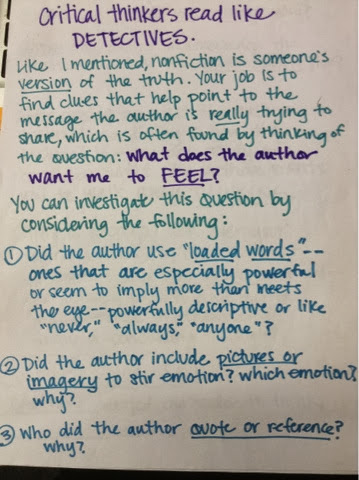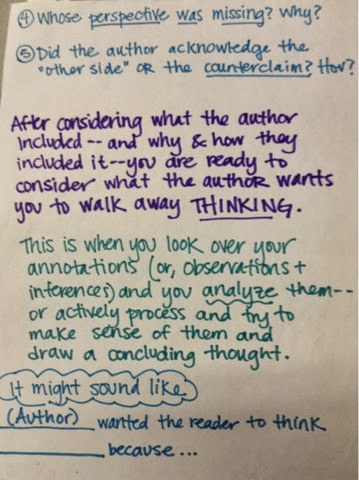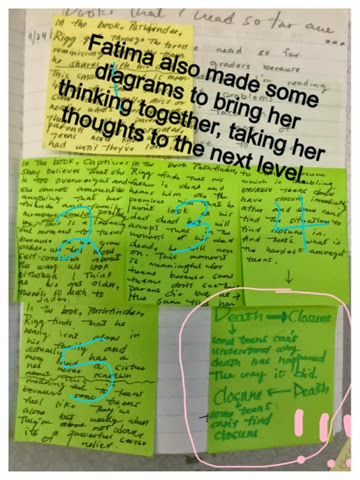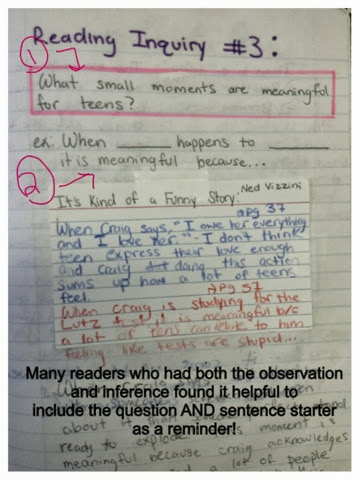A home base for Ms. Christensen's and Ms. DePalma's ELA classes. Check in here to find someone's blog, to access resources for class assignments, or to look for mentor texts.
Monday, October 28, 2013
Polishing and Crafting your Draft!
These are the quick in-class revision strategies we used to make our essay drafts stronger in a short amount of time:
Monday, October 21, 2013
Notes for creating an outline
Taking the time to create an outline will help prevent those horrible moments of staring at a blank page and having no idea what to write. Writing a meaningful outline may take time (and "mental gymnastics" as I like to say), but is ultimately worth it. Here is how I created mine, using the claim I created at the beginning of the unit (and made the decision last week to stick with) that 8th graders should have access to books abut death because they can teach teens how to process through loss if and when they face it:
"Reading" Visual Media
- News broadcast about a book banning in Houston (ed note: please disregard the biased, offensive title in the youtube link. This was the only form of the newscast I could find)
Feel free to search for and analyze other videos about book banning!
Tuesday, October 15, 2013
Book Banning Resources for Argument Essay
We read "Darkness Too Visible" and "Banned Books We Loved" together in class to study how readers can make meaning from lengthy and challenging texts and the craft moves authors use convey those ideas:
Here are links to those articles, as well as the ones available to you during our independent reading research periods that you can use as support in your argument essay or read to broaden your knowledge of the topic:
Age Rated Books: Right or Wrong? from BBC News
Man from Ministry Bans Potter from The Boston Globe
Darkness Too Visible from The Wall Street Journal
Has Young Adult Literature Gotten Too Dark? from Salon.com in response to Darkness Too Visible
Sherman Alexie, author of The Absolutely True Story of a Part Time Indian, responds to Darkness Too Visible
Ellen Hopkins' Banned Book Manifesto
Yes, teen fiction can be dark, but it shows teenagers they aren't alone, The Guardian's response to Darkness Too Visible
Megan Cox Gurdon's follow up to Darkness Too Visible: My "Reprehensible" Take on Teen Literature in the Wall Street Journal
Reading Improves Empathy from The Guardian
Sick Lit Books Aimed at Children by The Daily Mail
The Guardian's response to "Sick Lit" article from The Daily Mail
Perks of Being a Wallflower removed from the Chicago Tribune
Students ask school board to reconsider Perks of Being a Wallflower from The Chicago Tribune
Perks of Being a Wallflower reconsidered from the Chicago Tribune
Here are links to those articles, as well as the ones available to you during our independent reading research periods that you can use as support in your argument essay or read to broaden your knowledge of the topic:
Age Rated Books: Right or Wrong? from BBC News
Man from Ministry Bans Potter from The Boston Globe
Darkness Too Visible from The Wall Street Journal
Has Young Adult Literature Gotten Too Dark? from Salon.com in response to Darkness Too Visible
Sherman Alexie, author of The Absolutely True Story of a Part Time Indian, responds to Darkness Too Visible
Ellen Hopkins' Banned Book Manifesto
Yes, teen fiction can be dark, but it shows teenagers they aren't alone, The Guardian's response to Darkness Too Visible
Megan Cox Gurdon's follow up to Darkness Too Visible: My "Reprehensible" Take on Teen Literature in the Wall Street Journal
Reading Improves Empathy from The Guardian
Sick Lit Books Aimed at Children by The Daily Mail
The Guardian's response to "Sick Lit" article from The Daily Mail
Perks of Being a Wallflower removed from the Chicago Tribune
Students ask school board to reconsider Perks of Being a Wallflower from The Chicago Tribune
Perks of Being a Wallflower reconsidered from the Chicago Tribune
Thursday, October 3, 2013
8th grade level annotations and amazing peer mentors!
As 8th grade readers, making an observation is only the first step into meaningful reading inquiries. To grow as thinkers, we must slow down and really go deep with what we noticed. Be sure to answer all parts of the inquiry question so that your notes can help build powerful ideas later.
For example, if you are looking for powerful small moments for teenagers in your text, you can:
1. Jot down the moments quickly as you read and leave space in between.
2. Go back and add your thoughts to them later, when you aren't immersed in your book.
Notice how these readers had a space on their inquiry page for not just what they observed, but what they were thinking about their observation. After observing, think about what you can do to make your reading inquiries more meaningful, especially since you will be sharing them with your new book groups! You always want to be at your book group meeting with some ideas formed and ready to share!
Subscribe to:
Posts (Atom)











